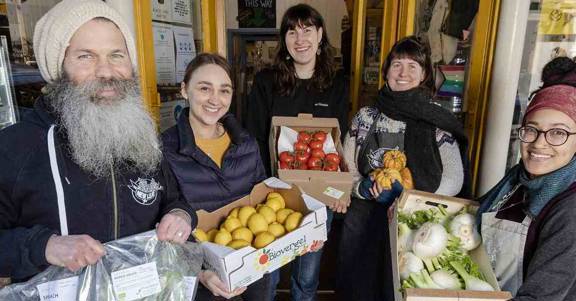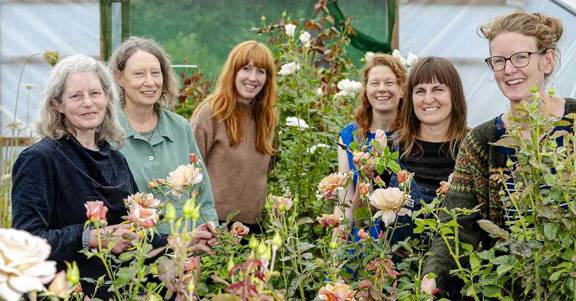How Granite Care Consortium became a consortium co-operative
Find out how support from Co-operative Development Scotland helped the group to become a consortium co-operative.

21 Jun 2021 | 5 minute read
About Granite Care Consortium and consortium co-operatives
Established in 2020, Granite Care Consortium (GCC) is a consortium co-operative that was set up to deliver a multi-million-pound public sector care contract in the north east of Scotland. The innovative partnership brings together independent third and private sector care providers with decades of experience in supplying health and social care services.
What is a consortium co-operative?
Consortium co-operatives are established when businesses come together for a shared purpose such as exporting, marketing or jointly bidding for contracts. By collaborating, businesses can pool resources and knowledge to achieve growth and drive innovation, while sharing the associated costs and risks.
The consortium co-operative model gives all member businesses an equal say, regardless of size, allowing small businesses to work together to achieve scale.
Joining forces to bid
Creating a consortium was a suggestion included in the tender guidance materials provided by Aberdeen City Council. The council was looking for one operator to deliver its Care at Home Aberdeen City Contract which combines virtually all publicly provided home care services in the city.
After working with Partnership for Procurement (P4P), to learn more about different consortium models and receiving support with drafting an initial partnership agreement, the group decided to join forces as an informal network to bid for the contract.
Support from Co-operative Development Scotland
Following successful award of the contract, the pioneering group formalised its structure into a consortium co-operative using support from Co-operative Development Scotland (CDS). This enabled the group to enter into the contract and to benefit from a democratic structure and a framework to support its effective delivery.
CDS worked through an options analysis with the member businesses before guiding them through the process of formalising their relationship and setting up the consortium. The consortium also provided a vehicle for the sub-contracting of service delivery to member organisations.
Matthew Reid, GCC Board member and Head of Development at Inspire, one of the member organisations, said: “We've formed our consortium to provide users with quick and easy access to person-centred, integrated care so that they feel supported, safe and well. It creates market stability, improves outcomes for our users and helps to build a consistently trained and skilled workforce.
“We worked with Neil Young at P4P who was very helpful, assisted us to understand our options and to produce a memorandum of understanding at the outset. We also utilised the free support available from CDS which was invaluable when taking into account and respecting the views and wishes of all organisations.
“A number of alternative structures were considered by the group, including continuing on an informal basis, however it was felt that the consortium co-operative model provided the optimum balance between good governance and equity between members.
“The Council requested members’ guarantors to ensure each member was committed to delivering on their obligations as a sub-contractor in the contract, but even with that and registering the company, the process was relatively quick, taking just four months in total to setup.”
GCC members
Granite Care Consortium has ten members:
- Aberdeen Cyrenians
- Ann Inspired Care
- Archway
- Blackwood
- Inspire
- MyCare
- Paramount Care
- Penumbra
- Specialist Resource Solutions
- VSA
Benefits of the consortium model
The consortium model allows the member businesses in GCC to collaborate effectively. The group can pull together its resources and expertise, knowledge and skills, providing support to each other without any competitive element.
Each service user benefits from a person-led approach, building on GCC’s shared values and focusing on the individual’s needs and hopes.
Nick Price, GCC Co-Chair and Managing Director at MyCare explained: “Bringing together ten highly experienced and trusted providers, from both the independent and 3rd sectors, with over 400 years’ combined experience, allows the consortium to achieve the best outcomes for individuals in the most efficient way. This coalition of business and service expertise has resulted in a co-production, partnership working relationship not seen previously within Scotland’s health and social care sector.
"Underpinned by our unparalleled knowledge and expertise in Aberdeen, this true spirit of partnership maximises market stability and reliability, all while driving up standards of care locally.
“We make and implement decisions together, being jointly accountable for the results.”
Collaboration and working together has been key to success for GCC. Positively leveraging the consortium’s experience and capabilities, it's working with the Aberdeen Health and Social Care Partnership to transition to a new way of working, moving away from time-and-task approaches and towards outcome focused working whilst promoting enablement for staff and service users.
Through the network of businesses, individuals have access to a broad range of support across all key care sectors to address their needs. Delayed discharge is being minimised with inter-agency co-operation across the consortium and resources and capacity are effectively managed across care and support networks.
Matthew said: “We're working closely with Health and Social Care Partnership colleagues to strengthen systems to increase responsiveness and to ensure the ongoing reliability of the service within Aberdeen, capitalising on all opportunities for efficiency savings to maintain our ability to accept referrals and sustainably meet all requirements.
“Innovation is also critical in ensuring people’s safety and wellbeing during the response to the Covid-19 pandemic. These same innovations will continue to contribute towards supporting people to live with optimal independence.”
Looking ahead, Matthew said: “Whilst we’re focusing on executing the Aberdeen City Council contract, we may consider other opportunities in the future including other care contracts. If other local authorities in Scotland are open to the collaborative approach, then it's something we could potentially look at doing elsewhere. There could be growth potential for all members within the consortium.”
Early-stage help from P4P
The group also benefitted from early-stage support from Partnership for Procurement (P4P). P4P supports social enterprises and the wider third sector to collaborate, including both joint tendering and collaboration more generally. P4P offers a range of downloadable guidance and resources, practical advice and support from specialist advisers and regular workshops, events and training.
P4P regularly works with CDS to support organisations through the process, and in this case Granite Care Consortium was referred to CDS by P4P.
Neil Young at P4P said “At P4P we believe that third sector organisations can achieve much more by working together, whether that’s in partnership with other third sector organisations only, or between the third and private sector. The Granite Care Consortium is a great example of this, with joint ownership and decision making at the heart of the consortium co-operative model.”
Find out more about the partnership by listening to the CDS’ podcast on achieving a fairer economy through collaborationopens in a new window with guests Jaye Martin, Specialist Adviser at CDS and Neil Young, a co-ordinator at P4P.
Get support to set up a consortium
Co-operative Development Scotland (CDS) provides free support to any group of businesses considering setting up a consortium. During the initial discussions, CDS will get an understanding of what your group wants to achieve and explore whether the consortium model would be a good fit.
Read more about how Co-operative Development Scotland can help
Want to learn more about business collaboration?
Get in touch to find out more about collaboration and the types of support available.
You might also be interested in
-

Argyll and the Isles Tourism Co-operative
Discover how a collaborative business model is helping Argyll and the Isles bring the world to their door.
-

Inclusive business models
Find out more about co-operatives and the support available to help you get started with our inclusive business model video series.
-

Co-operative business support
Co-operatives increase prosperity and equity, creating better opportunities for everyone and spreading the benefits of economic success more evenly.
